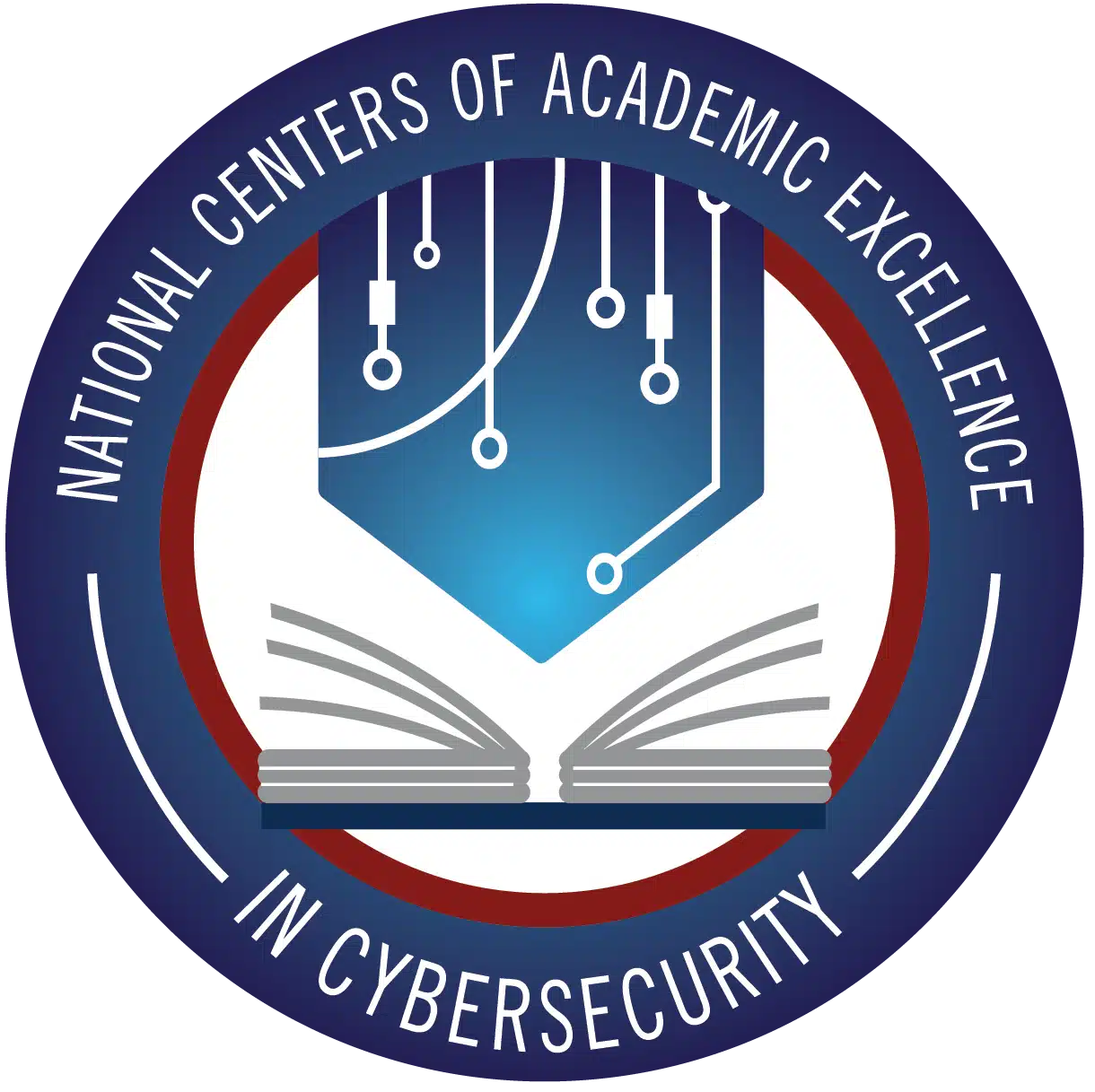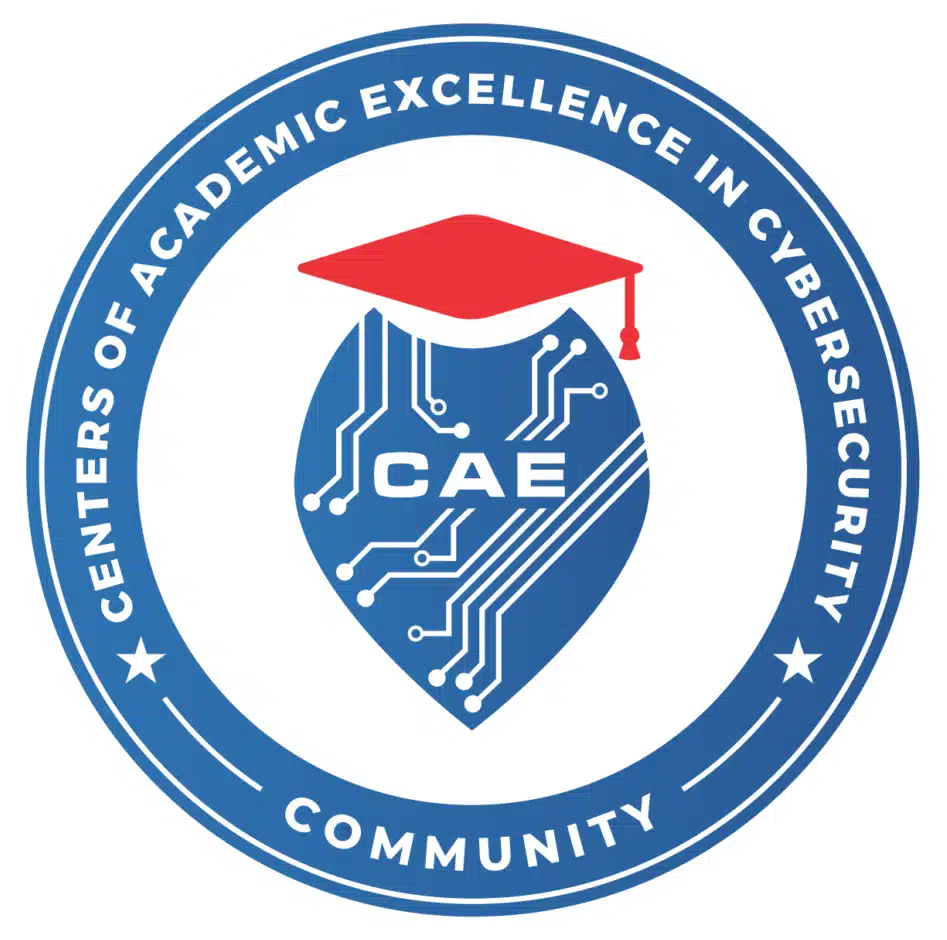Online Master of Science in Cybersecurity (MSCYB)
Prepare to design, direct, and manage the next generation of secure cyber infrastructure.

Your Journey Starts Now
Guidance Every Step of the Way


The School of Engineering and Computing at Fairfield University has been designated a National Center of Academic Excellence in Cyber Defense (NCAE-CD) by the National Security Agency recognizing the school’s commitment to cybersecurity education and its role in contributing to the protection of the National Information Infrastructure

Why Choose an Online Master of Science in Cybersecurity Degree from Fairfield?
Career
Readiness
Gain practical training with our virtual, state-of-the-art cybersecurity lab that offers students an interactive learning experience using real-world applications.
Tailored Degree
Choose between the management or technical concentration track, allowing your degree to be tailored to your desired field/interests.
World-Renowned Faculty
Learn from industry experts whose work has included leading corporate information security teams, engineering web-based and native applications, and investigating international technology information crimes.
Expansive
Network
Draw on the professional network Fairfield has built in the engineering industry as you connect with experts who can help propel your career forward.

Fairfield offers several financial resources for our graduate students to help you attain your advanced degree. Exceptional graduate students pursuing the following programs may be considered for the Graduate Merit Scholarship:
Creative Writing (MFA)
Cybersecurity (MS)
Marketing Analytics & Strategy (MSMAS)
Master of Public Health (MPH)
Program Specifics
The 100% online MSCYB was specifically designed with flexibility in mind to meet the needs of full-time and part-time students. The School of Engineering at Fairfield University has been designated a National Center of Academic Excellence in Cyber Defense (NCAE-CD) by the National Security Agency, recognizing the school’s commitment to cybersecurity education and its role in contributing to the protection of the National Information Infrastructure.
- Program Starts: Fall (September), Spring (January), and Summer (May)
- Schedule: Full-time or Part-time
- Credits: 30
- Completion: 12-24 months

The MSCYB emphasizes the need for practical knowledge and understanding of computer systems. Students will learn to recognize best practices and master the fundamentals of cybersecurity, including threats and vulnerabilities and the tools, technologies, and strategies used to manage it.
- Courses examine interface with the web, databases, networks, and a diverse number of techniques used to fingerprint; map networks, websites, and systems; evaluate weaknesses; attack strategies and methodologies; and perform remediation techniques.
- Students will learn to design, implement, and evaluate cybersecurity solutions applying security principles and practices to maintain operations in the presence of risks and threats.
- Coursework in this program prepares you to function effectively as a member or leader of a cybersecurity team.
Tuition for the MSCYB is $32,850 ($1,095 per credit hour).
Cybersecurity Certificate: $13,140 ($1,095 per credit hour).
Please see the Tuition and Financial Aid page for more information.
The MSCYB program is open to students with bachelor’s degrees in any discipline. An undergraduate GPA of 3.0 or better is preferred but not required.
Applicants that do not have an education or experience in information technology may be required to complete six credits of bridge coursework during their first year of the program. Transcripts and your resume will be used to determine if the bridge courses are required.
No GRE required.
Please note that Fairfield University cannot supply F-1 Visa I-20 documentation for international students enrolling in online or low-residency programs, like the MS in Cybersecurity.
Here’s what you will need to apply:
- A completed online application.
- A non-refundable $65 application fee paid by credit card. Application fee is waived for current Fairfield students and for those who attend an information session.
- A professional resume. Applicants are required to submit a current resume that includes employment and education history.
- A personal statement. Students should describe why they want to undertake graduate studies in cybersecurity.
- Official transcripts from all colleges and universities attended demonstrating a cumulative GPA of at least 3.0. All foreign transcripts must be evaluated by an approved evaluating service.
- Two recommendation letters — one of which must be from a current supervisor or professor, accompanied by the University online recommendation forms.
Faculty Spotlight
Career Outcomes

Career Insights from an Alumnus
Gain a firsthand perspective from a Fairfield MS in Cybersecurity graduate, Ralph Riley, MS’24, as he shares his experience in Fairfield University’s online master’s in cybersecurity program. In this video, Ralph highlights how the program has advanced his career by equipping him with skills and knowledge in the cybersecurity field. He also shares how Fairfield’s online format fostered meaningful connections with both faculty and classmates, creating a dynamic and collaborative learning environment. Discover how Fairfield’s commitment to excellence in online education empowers professionals like Ralph to achieve their goals and make a lasting impact in the rapidly evolving world of cybersecurity.
Expand your industry expertise and boost your resume with a certificate that can be directly applied toward your master’s degree.
- Cybersecurity Certificate
Cybersecurity Certificate
We offer a Cybersecurity Certificate you can put to use in the workforce and apply toward our Master of Science in Cybersecurity program:
- Develop technical competencies in information security controls, network and cloud security, and data protection.
- Streamline your path to a degree by applying your certificate credits directly toward a Master of Science in Cybersecurity without repeating any courses.
- Elevate your expertise in real-time by benefiting from industry experts and furthering your technical abilities through practical training that’s directly applicable to the workforce.
Spring, Summer, or Fall
Full-time or Part-time
4-8 months
$13,140 ($1,095 per credit hour)
Degree Courses
Fairfield University’s online Cybersecurity program delivers a comprehensive, career-focused curriculum that prepares students to protect and manage information systems in complex digital environments. Students develop expertise in network and application security, ethical hacking, digital forensics, and emerging technologies, while applying hands-on skills through advanced labs and a capstone project. The program equips graduates to lead cybersecurity initiatives, manage vulnerabilities, and implement robust security strategies across industries.
Introduction to Information Security
Credits – 3
This course gives students a fundamental understanding of current social engineering methods in the information security arena. Deception and human behavior is exploited to gain valuable information, which is very relevant to today’s growing security concerns. This course is another key class in the information security track within the software engineering program, and builds upon the weaknesses in the human factor. Areas of discussion will be methods, current trends, and most of all countermeasures. Instruction includes lectures and discussion assignments which involve analyzing current work places and social gatherings coupled with scenarios of exploitation. Previously SW 0530.
Concentration Courses
Capstone Sequence
Fairfield Mission
Visionary by nature. Jesuit through mission. Transformative by design. Our mission inspires us to impact the world. It prompts us to ask important questions, to embrace our social responsibilities, and to lead by example. It’s what has made us a premier institution in the Northeast. Let the mission be part of your journey.





